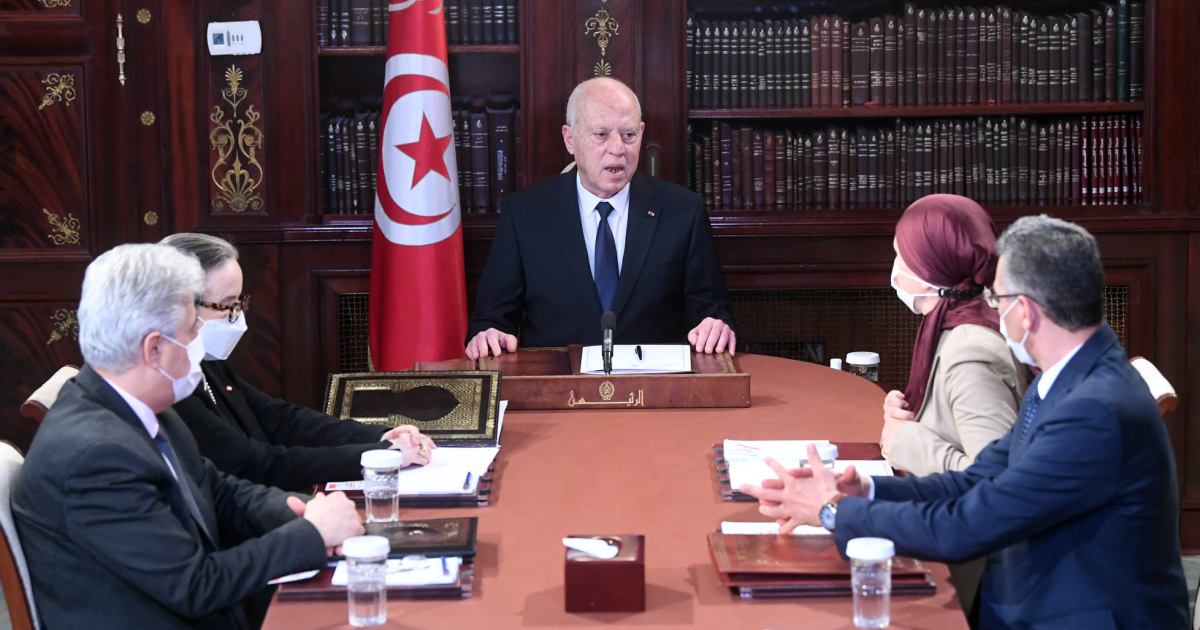There were criticisms from Tunisian institutions and parties of President Kais Saied's plan to prepare a new constitution and referendum on it, and his call for a dialogue that excludes "traitors", as he put it. The critics demanded a "real" dialogue without prior decisions.
The Secretary-General of the Tunisian Labor Union, Noureddine Tabboubi, reiterated the union's position towards the president's call, and said that consensus on the major national options cannot be "imposed by force or by acknowledgment of the fait accompli."
He continued in his statements - during the award ceremony of the Ideal Worker today, Saturday - "It is imperative that the consensus stem from honest and impartial dialogue without dictates."
The Union - which is the largest Tunisian trade union organization - called on Friday for a real, direct and broad dialogue in which there are no pre-decisions or recommendations for conclusions prepared for it in advance, and agreement on its objectives, framework, parties and axes.
In a statement, the union reiterated its rejection of any useless, conditional, formal dialogue that marginalizes the active national political and social forces.
He expressed his rejection of any adventure targeting the country's unity through the establishment of "strange parallel entities" that would deepen the crisis and lead to collision and further division, and called for an end to it.
Marzouki's party criticizes
Criticisms continued from the partisan forces as well. The "Hrak Tunisia of Will" party - founded and headed by former President Moncef Marzouki - warned that the "revolutionary path" taken by President Kais Saied reached a dangerous zigzag, with which Tunisia's stability and security became threatened with real imminent danger. under the erosion of constitutional institutions.
The party added - in a statement issued today, Saturday - that the situation has become "requires a firm stand by the forces defending democracy to stop the dangerous deterioration the country is witnessing."
The party - which is involved in the National Salvation Front - confirmed that it will only recognize the 2014 constitution, and that it sees efforts to abolish it and replace it with a constitution that "is considered in dark rooms ... as a betrayal of Tunisia," according to the statement.
In the same context, the Ennahda movement called on Friday - in a statement by its executive office - for a dialogue to achieve political stability.
The movement expressed its rejection of what it described as a mock, selective and exclusionary dialogue, and promised it to deepen the political crisis that the country is experiencing in the context of an economic situation that is on the verge of collapse, as it put it.
The statement warned against "the project of dismantling state institutions in preparation for the establishment of the grassroots construction system", in reference to the project of the new republic approved by the head of state.
For its part, the Republican Party expressed - in a statement - its categorical rejection of President Saeed's call to establish a "sham dialogue that excludes political parties and the live forces in the country."
The party saluted the "Tunisian General Labor Union's refusal to participate in this dialogue," calling on "the rest of the national organizations to follow its path and not get involved - even in silence - in recommending options that will further deepen the crisis and push the country to the edge of the abyss."
In early May, the Tunisian president announced that his government would form a committee to write a new constitution for the country to be submitted to a referendum on July 25, according to a vision for the establishment of a "new republic".
Saeed said that "the text (decree) related to the dialogue will be issued soon, despite the lack of desire for it," without specifying who does not.
The Tunisian president stated - in a meeting with officials of the Ministry of the Interior last Thursday evening - that there are those who “infiltrated state institutions in order to detonate them from the inside”, who do not want a referendum or elections, but rather want to fall into the arms of the outside and burn the state and its institutions, as he put it.
Judiciary file
On the other hand, Tunisian media quoted the head of the Supreme Judicial Council - which was dissolved - Youssef Bouzakher as saying during the annual meeting of the African group of the International Federation of Judges that nothing has changed in the judicial system and no reform has taken place.
Buzacher stressed that judicial reform "has been reduced to dissolving the council and targeting its members."
In the same context, the head of the Tunisian Judges Association, Anas Al-Hammadi, said that President Said does not listen or participate in his unilateral decisions aimed at putting a hand on the judiciary.
Al-Hammadi added - in a radio statement - that Saeed did not carry out any reform in the judiciary and that there is no communication between the Association of Judges, the government and the Presidency of the Republic who "follow a policy of unilateral decision-making."
Al-Hammadi also ruled out the possibility of inviting them to participate in the national dialogue, and at the same time confirmed the association's openness to real dialogues, not formal ones that convene only to ratify previously taken decisions, as he put it.

